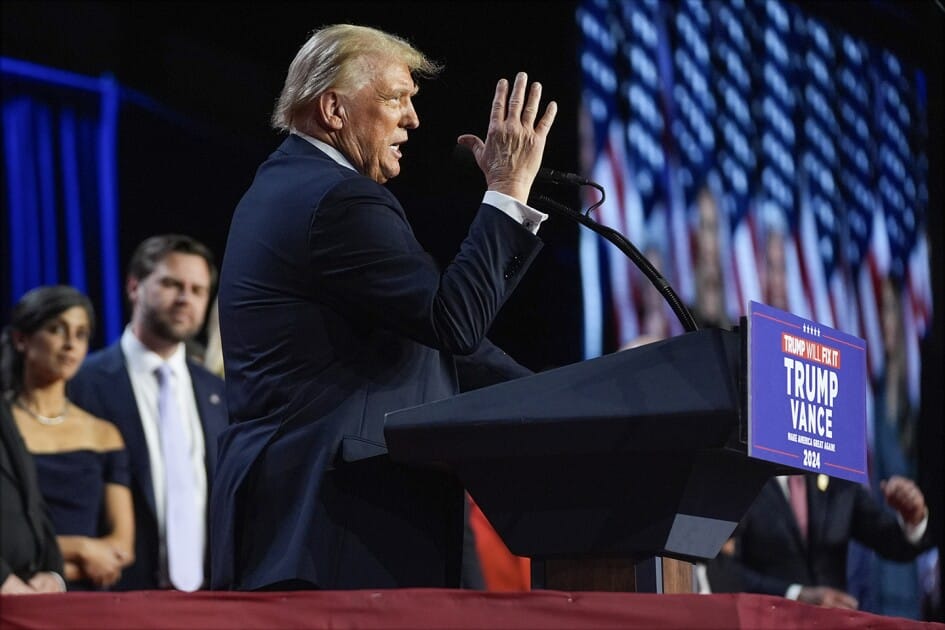With former President Donald Trump set to return to the White House, there will undoubtedly be an impact on the American education system.
Trump was declared the winner early Wednesday morning. He is the second president in U.S. history to be elected to non-consecutive terms, and the first convicted felon to win the office.
Trump spent little time on the campaign trail focused on education policy. In the little he did say on the topic, he reiterated longtime talking points, criticizing schools for spending too much, calling for the end of the U.S. Department of Education, and railing against “teaching woke.”
Here are four things to know about how a second Trump presidency may play out in K-12 education.
A key factor will be who Trump appoints as secretary of education
The person who helms the Education Department—or oversees national education policy—is a key factor in the direction and tone of what happens with K-12. And with Republicans taking control of the Senate, anyone he puts forward will likely be confirmed.
Trump’s secretary will likely support slimming down if not dismantling the Education Department; expanding private school choice; slashing federal K-12 spending; and attacking school districts’ diversity, equity, and inclusion initiatives.
Republicans in Washington who work on education issues have floated Cade Brumley, Louisiana’s state superintendent of education; Ryan Walters, Oklahoma’s superintendent of public instruction; and Tiffany Justice, the co-founder of Moms for Liberty, as possibilities.
At a campaign event in September, Trump floated two other potential candidates: Vivek Ramaswamy, an entrepreneur who ran for the GOP presidential nomination before dropping out and endorsing Trump, and former U.S. Rep. Lee Zeldin of New York, who left Congress last year after an unsuccessful bid for governor.
Trump has also mentioned Ramaswamy for other roles in his administration.
It’s unlikely Trump will tap Betsy DeVos to serve as his education secretary again, as he did in his first term. DeVos resigned from Trump’s cabinet in a letter dated Jan. 7, 2021, in which she blamed Trump’s rhetoric in part for inciting the violent insurrection on the U.S. Capitol the previous day.
Trump has vowed to abolish the Education Department, but that will be tough to pull off
Speaking of the Education Department, Trump has vowed—again—to abolish the agency, or at least significantly limit its authority.
It’s a move he’s tried before and has proven virtually impossible to pull off, even as it’s remained a conservative priority for decades.
“We will have one person plus a secretary, and all the person has to do is [ask schools], are you teaching English?,” Trump said at an October campaign stop in Milwaukee. “Are you teaching arithmetic? What are you doing? Reading, writing and arithmetic, and are you not teaching woke? Not teaching woke is a very big factor, but we’ll have a very small staff.”
Trump’s calls to end the department tap into institutional distrust and conservative concerns about the federal role in education. Republicans have been sharply critical during President Joe Biden’s administration of his efforts to forgive student-loan debt and rewrite Title IX regulations to direct schools to allow transgender students to use restrooms that align with their gender identity and enforce other protections for LGBTQ+ students.
Former President Ronald Reagan made similar promises to dismantle the Education Department in the 1980s, and his administration was also unsuccessful.
Supporters and opponents believe Title IX will be an early Trump target
Biden’s new Title IX regulation is expected to be in Trump’s crosshairs when he assumes office.
Fans and critics alike expect that Trump will seek to overturn the rule, which expands the scope of the law’s prohibition on sex discrimination so it also applies to discrimination based on sexual orientation and gender identity. The new regulation is already on hold in 26 states and individual schools elsewhere as the result of litigation from Republican-led states.
Trump could also support the creation of a federal parents’ bill of rights, which aims to empower groups like Moms for Liberty that have sought to keep books about race and gender identity out of schools and gain public access to school curricula.
He could also again use the office for civil rights to target districts for their diversity, equity, and inclusion initiatives. In Trump’s first term, OCR took legal action against a Connecticut district that allowed students who were born male but identified as female to compete in girls’ sports. His administration could use OCR to target districts taking similar steps.
Universal school choice is a concrete and high-priority policy idea
Trump distanced himself from Project 2025—a conservative policy agenda created by the Heritage Foundation that calls for universal school choice—but the official Republican Party platform, which he has endorsed, also calls for universal school choice.
In his first term, Trump attempted to establish a federal tax credit scholarship for private schools that never gained traction.
Now, legislation to create a such a program has passed a U.S. House of Representatives committee. Though the bill would be unlikely to pass in the Democratic-controlled Senate this year, it could gain momentum in a Trump presidency if Republicans capture control of both chambers of Congress. (They’ve already clinched control of the Senate.)
Meanwhile, there’s substantial state-level momentum for private school choice. Twelve states have at least one private school choice that’s accessible to all K-12 students in the state or is on track to be, according to an Education Week analysis.
2024-11-06 18:59:41
Source link

